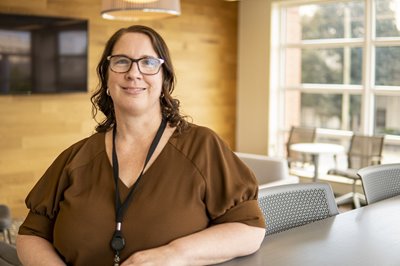In the counties surrounding the Way Finders offices in Springfield, Massachusetts, the need for resident support was growing rapidly. With the spread of COVID-19 and the loss of jobs and income, more people needed rental and other assistance. The NeighborWorks network organization responded swiftly, adding new programs and hiring dozens of staff members to meet those escalating needs. How much did they scale up?
During a typical year, Way Finders helps 800 to 900 families through a state program known as RAFT (Residential Assistance for Families in Transition.) But in the last fiscal year, the organization served more than 6,000 residents, linking them with $32 million in resources.
 Keith Fairey took the helm of Way Finders as president and CEO in July of 2020. This month, he explained how the organization increased capacity from previous cycles, where "we'd get about $2 million and run out of money every year." Six of Way Finders' 240 staff members administered those $2 million to help families with rental, mortgage and utility assistance and other emergencies.
Keith Fairey took the helm of Way Finders as president and CEO in July of 2020. This month, he explained how the organization increased capacity from previous cycles, where "we'd get about $2 million and run out of money every year." Six of Way Finders' 240 staff members administered those $2 million to help families with rental, mortgage and utility assistance and other emergencies.
But when COVID-19 hit, the city of Springfield allocated another $2 million in CARES (Coronavirus Aid, Relief and Economic Security) Act dollars to Way Finders, doubling the program. Then, on October 17, 2020, the state ended its eviction moratorium, establishing instead a $100 million eviction diversion initiative that included an expansion of RAFT and funding for legal services and mediation. "That month, as people were bracing for what we thought would be mass evictions, especially in Springfield and Hampden County, we received 2,500 applications," Fairey says. "Just us. It overwhelmed us."
Changing the workflow
What's more, the applications Way Finders received needed work. "People were completing applications online, but they didn't really know how to use technology; they didn't know how to upload documents," explains Jodi Smith, who began working in November 2020 to help streamline the case management system. "Eighty percent of the applications were incomplete."
After consulting with the state and examining their system, Way Finders began hiring "application chasers" to follow up on the assistance applications, making sure each individual had what they needed to move to the next stage. That cut down processing time – which at one point took as long as 15 weeks – to five or six weeks. In emergency cases, such as pending evictions or utility shut-offs, they can turn the application around in 24 hours or less. Way Finders also developed a data dashboard so they'd know how many applications were coming in and where they were in the process. Now, Way Finders can look at which cases are taking too long and figure out why. Smith attributes data and a committed staff to their success. "Our community is on fire," she says. "Policies keep changing. The staff is working so hard."
chasers" to follow up on the assistance applications, making sure each individual had what they needed to move to the next stage. That cut down processing time – which at one point took as long as 15 weeks – to five or six weeks. In emergency cases, such as pending evictions or utility shut-offs, they can turn the application around in 24 hours or less. Way Finders also developed a data dashboard so they'd know how many applications were coming in and where they were in the process. Now, Way Finders can look at which cases are taking too long and figure out why. Smith attributes data and a committed staff to their success. "Our community is on fire," she says. "Policies keep changing. The staff is working so hard."
Fairey also points to his team as a bright spot. "We used to run one program. Today we run three programs for the state and two local programs, all with slightly different rules as we try to figure out how to help each client in the best way possible." The program's staff of six has grown to nearly 70 working on emergency financial assistance programs; staff has grown to 320 overall.
"What we're experiencing is an ongoing crisis," Fairey says. "None of the demand has abated. We still get hundreds of applications." But now, they're able to move them forward as they continuously improve and engage with the community.
Fighting Evictions
Meanwhile, Way Finders continued its work helping individuals stay in their homes. Even before the pandemic, Way Finders had a staff member who sat in Housing Court to assist residents fighting eviction. Now, they have two staff members who alternate in that role --homelessness prevention specialists who work, as many NeighborWorks organizations do, to keep people housed. "People rely on us heavily," Smith says.
The organization's new virtual capabilities lent themselves to helping in Housing Court, too, Fairey shares. This October, for instance, a woman appeared in court even as movers waited outside her home. Way Finders staff members fast tracked her assistance application so she could present an award letter to her landlord for arrears. The movers left without moving a stick of furniture; the family stayed in their home.
Smith says once judges know a resident has applied for emergency assistance through Way Finders, they can do a "stay" or have another hearing, giving applications more time to get through the process. The eviction diversion initiative also gives residents a chance to have free legal representation in court. And Way Finders' data tracking will help with programs long after the pandemic is over, Smith adds.
According to a housing study by the UMass Donahue Institute, more than half of the renters in the Springfield region were "cost burdened," numbers that outpace the state numbers for renters, Fairey says. "Moreover, these circumstances disproportionately impact households of color as 70% of Black and Hispanic households are renters and only 30% of white households are renters in our region." The study concludes that the pandemic "has complicated the economic future of the region and may likely produce more inequality in housing in the near future."
The ongoing relief effort is helping stabilize families, Fairey says, "but this is not recovery. That comes next." Way Finders will be a part of that effort, too.
Helping people find homes – and keeping people in them – is important to NeighborWorks America and the NeighborWorks network. Across the country, organizations like Way Finders are making a difference through programming and connecting residents with resources. NeighborWorks also offers tips for eviction prevention that includes outreach, communication and creating an action plan.
11/08/2021

